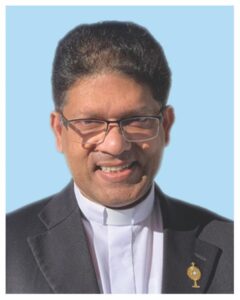
On this Sunday, the Gospel reading comes to us with two important questions and the answers to those questions. This event happens in the village of Caesarea Philippi. To understand the meaning of this event, we need to know the significance of this place. Caesarea Philippi was a city located in the foothills of Mount Hermon, about fifteen miles north of the Sea of Galilee. The name Caesarea Philippi consists of two names, namely that of Roman Emperor Augustus Caesar and King Philip. It was so named by King Philip himself, whose father, Herod the Great, had built a temple there.
This location is the site of an ancient temple dedicated to the Greek god, Pan – the god of victory in battle, music, and related activities. Before the arrival of the Greeks, Ba’al was the god of this worship place. Herod not only erected a temple dedicated to the pagan gods but also encouraged the worship of Emperor Caesar. In short, this is a place of different gods whom people worshiped in different generations.
So, Jesus is standing in a place of many gods and asks his disciples this question: “Who do people say that I am?” Their answers reveal that people had high opinions of Jesus. Some see Jesus as John the Baptist who came to prepare the way for the Messiah. He became a martyr as he chose to question the immoral life of the king. Many see Jesus as Elijah, the iconic prophet from the Old Testament. He is instrumental in eliminating idol worship and restating the worship of the real God. Elijah had been taken to heaven in a fiery chariot (2 Kings 2:11) and is believed that he would return to earth to proclaim the coming of the Messiah (Mal. 3:23-24; Sir. 48:9-12). It means that ordinary people have high opinions about Jesus and his ministry.
The second question is more personal and direct: “Who do you say that I am?” (Mk 8: 29). Peter, representing the present and future believers in Christ, loudly proclaims: “You are the Christ.” By proclaiming this in Ceasarea Philippi Peter is also acknowledging that Jesus is not like any other gods found in Ceasarea Philippi. Jesus is the Messiah, the one who is sent to save the people. In today’s world also, we see many people who admire Jesus and consider him a great teacher or even a revolutionary. Many people who belong to other religions also have no problem accepting many of the teachings of Christ. But Jesus repeats the question he asked Peter: “Who do you say that I am?” What should be our answer? Since we have personally encountered Christ in our lives, we should answer it from the depths of our hearts. Have we accepted Jesus our Lord and Savior in our lives? Can we prove that we belong to Christ through our words and deeds?
Now, we all need to make Peter’s confession our own. Everything we are and everything we do comes from knowing Jesus Christ personally. We also receive the blessing of seeing the true face of God through the face of Jesus. That is why Jesus says: “He who has seen me has seen the Father” (John 16:13). So, it is necessary to know Christ to experience God in our lives.
My dear sisters and brothers in Christ, the Face of Christ should be reflected in our face. By constantly seeking Jesus and walking in his ways, we can reflect Christ in our face. Until now, we might have been living for ourselves. So now on, let us start living every moment of our lives for Jesus.
Rev. Dr. Mathew Charthakuzhiyil



